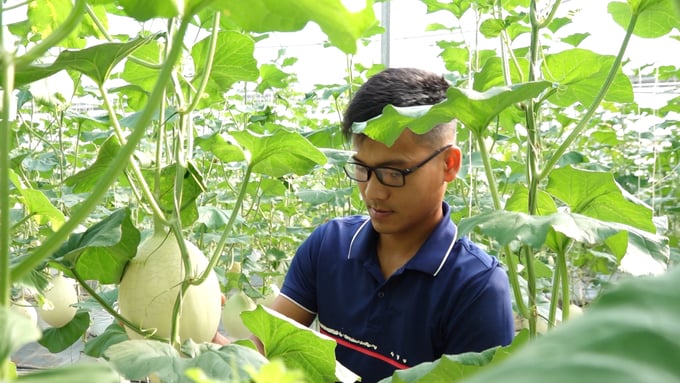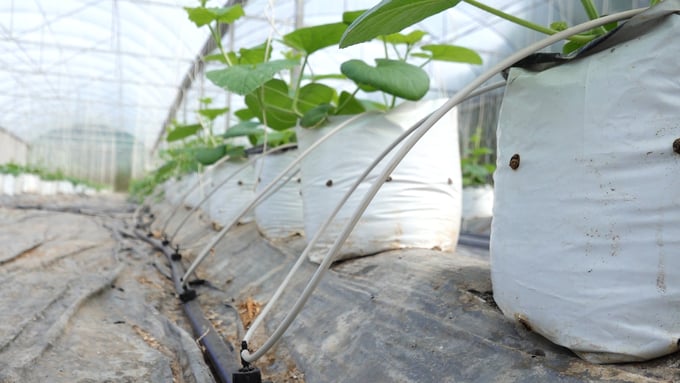September 24, 2025 | 14:36 GMT +7
September 24, 2025 | 14:36 GMT +7
Hotline: 0913.378.918
September 24, 2025 | 14:36 GMT +7
Hotline: 0913.378.918
Many households and farms in Thai Nguyen Province have adopted the model of cultivating melons in greenhouses with drip irrigation technology. Notably, the province is gradually expanding these models due to their high economic efficiency and the safety of their products for consumers.
As an exemplary model, the melon greenhouse farm belonging to Tran The Truong (Na Long Hamlet, Hoa Trung Commune, Dong Hy District), which utilizes drip irrigation technology, has paved the way for new agricultural development in the region.

Tran The Truong's greenhouse melon farm in Na Long Hamlet, Hoa Trung Commune, Dong Hy District. Photo: Quang Linh.
According to Truong, the young farmer has had a passion for agriculture since childhood. He had previously attempted to cultivate a variety of crops, but none delivered the desired results.
After researching the greenhouse melon cultivation model through newspapers and scientific workshops, Truong applied for a loan and invested 1 billion VND to construct a greenhouse system, install a water-saving irrigation system, and purchase seeds for a 3,000-square-meter area.
Melon seeds typically sprout their second leaf within 7 to 10 days. The growth cycle of a melon plant lasts approximately 75 days before the first harvest. After each harvest, the farm takes a two-week break for sanitation before starting the next season. Consequently, this model enables farmers to produce four crops per year without relying on weather conditions.
Truong currently intercrops melons with baby melons to establish a stable income source and meet consumer demand at different times of the year.
By following suitable tending protocols and closely monitoring nutrition and pest control, the melons on his farm have exhibited excellent growth. After 2.5 months, each 700-square-meter greenhouse yields 2.2 to 2.5 tons of fruit, with each melon weighing between 1.2 and 1.6 kilograms. The wholesale price for this variety of melon can reach approximately 26,000 VND per kilogram.
Truong's greenhouse system for melon cultivation features several outstanding advantages. Namely, it protects the crops from rain, sun, and insect invasion. By implementing an effective nutrition regime and avoiding pesticides, the products from his farm are always safe for consumption.
The melons are cultivated in grow bags placed on soil that is covered with plastic sheeting within the greenhouse. This method effectively prevents the entry of insects and restricts the presence of harmful pests. As a result, this farming model enables the melons to grow and develop rapidly.

The water-saving irrigation system helps reduce labor and save fertilizer. Photo: Quang Linh.
To consistently produce large, round melons with the desired sweetness, Truong established a strict fertilization regime, combining it with automatic watering through a drip irrigation system, which delivers water directly to each grow bag. The system is adjusted according to each stage of the plant's growth. When the plants bear fruit, Truong leaves only one melon per plant to ensure adequate nutrient supply.
"There are many benefits to the greenhouse cultivation model; however, they come with high investment costs. In the near future, I hope to expand the farm by another 1,000 square meters. I also hope that local authorities and government agencies will support and accompany me in developing additional farmland," Truong remarked.
Truong's greenhouse melon cultivation model in Dong Hy District, supported by drip irrigation technology, has introduced a new path of development for the local agricultural production scene. It also provides an opportunity for farmers in the area to learn from his experience and access advanced techniques and technologies, thereby enabling them to produce clean, safe products for consumers.
Melons are a short-term crop that delivers high economic efficiency, with stable prices and high yields when cultivated in greenhouses. Cultivating melons in greenhouses reduces the risk of pests and diseases, as the plant is highly susceptible to adverse weather conditions.
Growing melons in greenhouses during the rainy season enables farmers to maintain consistent production despite seasonal fluctuations, as they reach optimal growth during the dry seasons.
In addition to high economic returns, the organic and high-tech greenhouse melon cultivation model helps transform the mindset, habits, and cultivation practices of local farmers. Accordingly, it encourages a shift from traditional agriculture to safe, circular, and sustainable farming in response to market demands.
Translated by Nguyen Hai Long

(VAN) From its foundation, the Hoang Nguyen Organic Agriculture and Trade Cooperative, located in the former Thuan Ha commune of Dak Song district, Dak Nong province, chose a path of sustainable development through organic farming.
![Recycling food waste: [3] Benefits of black soldier flies](https://t.ex-cdn.com/nongnghiepmoitruong.vn/608w/files/huyenvt (e)/2025/09/24/2205-1-010400_440.jpg)
(VAN) Thoroughly treating organic waste with black soldier flies not only offers an eco-friendly solution but also generates products for livestock farming and crop production.

(VAN) Disease outbreaks in aquaculture still pose many risks because of rapid transmission, widespread, and high mortality rates, causing significant losses to the sector.

(VAN) The risk of ASF outbreaks remains. Applying biosecurity and modern technology is the “key” to pig herd protection and sustainable livestock development.
![Legal timber supply chain: [1] A 'passport' for Vietnamese wood to reach far](https://t.ex-cdn.com/nongnghiepmoitruong.vn/608w/files/huyenvt (e)/2025/09/23/4421-3-123323_409.jpg)
(VAN) With its abundant forest resources, Vietnam's forestry sector is building a legal timber supply chain to enhance the country's position as the world's leading hub for forest product production and exports.

(VAN) The results of the aquaculture cooperation project show positive prospects, with both sides committed to maintaining and expanding the model while enhancing local production capacity.

(VAN) Technical workshop at Nong Lam University, Ho Chi Minh City, emphasized the importance of antibiotic control in livestock production, contributing to the protection of public health.